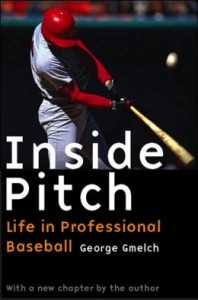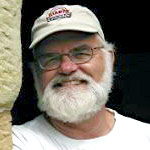George Gmelch: Inside Pitch
March 28, 2013 by David
Filed under Non-Fiction, WritersCast
 978-0803271289 – University of Nebraska Press Bison Books – paperback – $16 (no ebook edition available!)
978-0803271289 – University of Nebraska Press Bison Books – paperback – $16 (no ebook edition available!)
Given my longstanding interest in baseball and an early background in anthropology, it’s kind of surprising to me that I missed knowing about the work of George Gmelch until very recently.
I ran across George’s books in some random searching having to do with baseball, and happily was able to get an introduction to him through my anthropologist brother. When he was young, George was a baseball player, and a pretty good one. Like so many others, he played for several years in the lower minor leagues, but never made it to the Major Leagues. It’s possible he quit too early, but it’s also likely that he made the right choice to quit baseball and go back to school (and got his Ph.D. at UC Santa Barbara) and then became an accomplished cultural anthropologist, studying tourism, sport cultures, and migration. He has worked among and written about Irish Travellers, English Gypsies, return migrants in Ireland and Newfoundland, commercial fishermen, Alaska natives, and Caribbean villagers and tourism workers, and has taught at several universities.
Given his training as an anthropologist and his unusual background as a minor league baseball player, it made sense that he could study baseball players, perhaps in ways that non-players could never manage. So some 30 years after his playing days ended, George arranged with friends still in the game to spend time with major and minor league players as an observer. Over the course of five years, he interviewed more than 100 players, coaches and managers, and got to experience and document the inner workings and social milieu of modern day baseball as it is lived by its participants.
Inside Pitch: Life in Professional Baseball is nothing like a typical anthropological ethnography. There’s a great deal of George’s personal story throughout, and it’s neither dry nor academic. But the observational techniques and abilities of the trained anthropologist are brought to bear, as George ruminates on the differences between modern players and those of his own era.
It’s unusual for us to get an insider’s view of the game that gets past the public relations walls that the institution and all its participants have build around it to protect the image of the game. Minor league players, though rarely interested in George’s own experience as a player, were always willing to tell him about their experiences, and even normally wary major leaguers were willing to talk to him once he explained that he was a former player doing anthropology, not a reporter looking for an angle.
So if you love baseball, Inside Pitch is a terrific read, and will enrich your understanding of what it is really like to play professional baseball. I was especially taken with the writing about and the interviews with players that illustrated the psychological struggles that players go through. I recently read the excellent RA Dickey memoir, Wherever I Wind Up: My Quest for Truth, Authenticity, and the Perfect Knuckleball, which is a terrific complement to Inside Pitch, as so much of Dickey’s story is about how he managed to conquer his personal demons and harness his inner being to finally become a successful pitcher after years of struggle. Gmelch both give us many quotes of players talking about their mental struggles and writes about these issues perceptively.
Baseball is generally considered a cerebral game because of its complexity and pace. That, and the fact that there are so many games in a very long season, create a very challenging emotional and psychological environment for players. We rarely, if ever, get to see close up what that can mean for them. And because the vast majority of players who play in the minor leagues never make it to the majors or only get there for a brief time, reading about their struggles can change the way you think about the players who do get to the majors and stay there for any length of time. They really do have to be special, lucky and to have developed a solid psyche in order to be able to survive and thrive in such a difficult and fraught environment.
George Gmelch has written eleven books and now teaches at the University of San Francisco, where he co-directs the anthropology program. I’ve now got an earlier book of his, In the Ballpark: The Working Lives of Baseball People on my reading list as well. Talking to him about his experiences as a player, anthropologist and writer was a terrific pleasure for me.
 Alert to listeners: we had such a good conversation that I lost track of time, and this is a longer than average podcast at 54 minutes.
Alert to listeners: we had such a good conversation that I lost track of time, and this is a longer than average podcast at 54 minutes.
Podcast: Play in new window | Download
